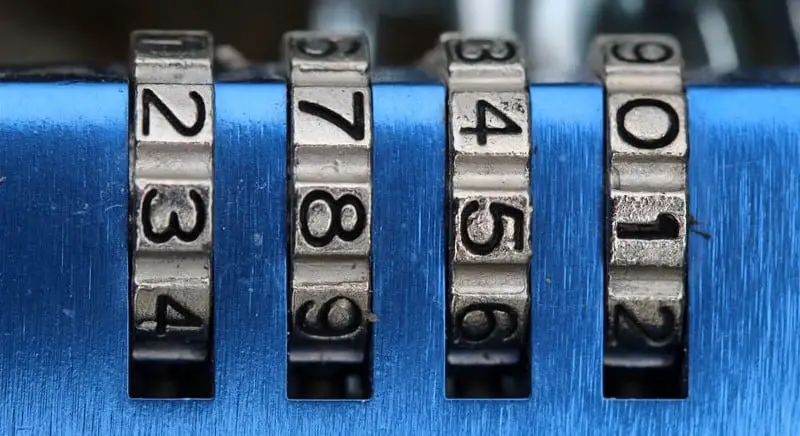(8min read)
It is highly likely that over time, you will have more than one crypto wallet, and not all crypto wallets work the same way. Therefore it is incredibly important to know how to choose the right cryptocurrency wallet for you, or your crypto could be at risk. Here is my overview guide to Crypto Wallets.
There are many ways to store crypto. You can keep things simple with a Custodial wallet, have full control of your crypto with a non-custodial wallet, have access to your crypto on the go with a Mobile Wallet or Browser wallet (Hot Wallets), take extra precautions with a Hardware wallet (Cold Wallet), or even have a mix of all of the above.
Lots of terms to understand, below we will explain them all!
Crypto Wallet Overview
If you already own some crypto then you have at least one wallet, whether you realized it or not!
A Crypto Wallet is where the information that allows you to access your digital currency (crypto coins or tokens) on the blockchain is stored. In order to purchase a coin, you need a wallet.
Wallets can come in various forms, Hardware wallets, Apps for your phone, Software-based, etc. The different types/formats allow you to make transactions with various degrees of security and convenience.
It is very common to have multiple wallets and multiple types of wallet.
Below we explain the differences and benefits of each but let’s start with understanding what a crypto wallet actually holds.
What is a Crypto Wallet?
The crypto world is all based on giant digital data records. Blockchains. Crypto wallets are how the transactions on the blockchain are identified. They do not actually ‘hold’ anything, they only point to the location where your digital currency is recorded.
All Crypto wallets are made up of two things, Public Addresses, and Private Keys. These are similar to a bank account number and its PIN code. They are how you can prove ownership of your digital currency and allow you to make transactions.
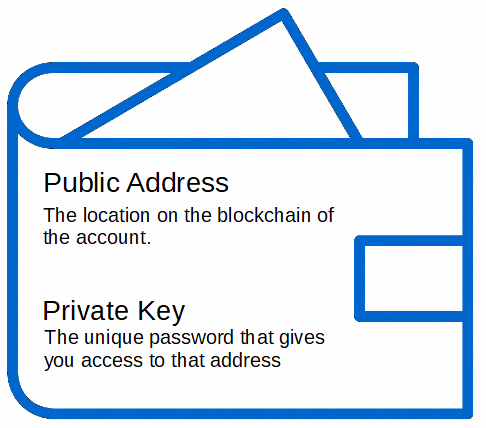
Each type of Crypto coin will have its own Public Address and Private Key.
The amount of that coin held in that wallet can change (eg buy, sell, trade etc) but the address and key stay the same.
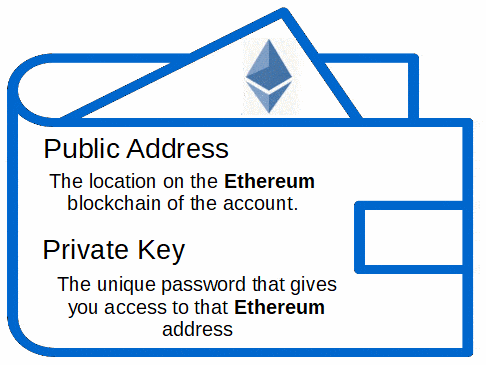
If you hold multiple Crypto coins, they each have their own Public Address and Private Key
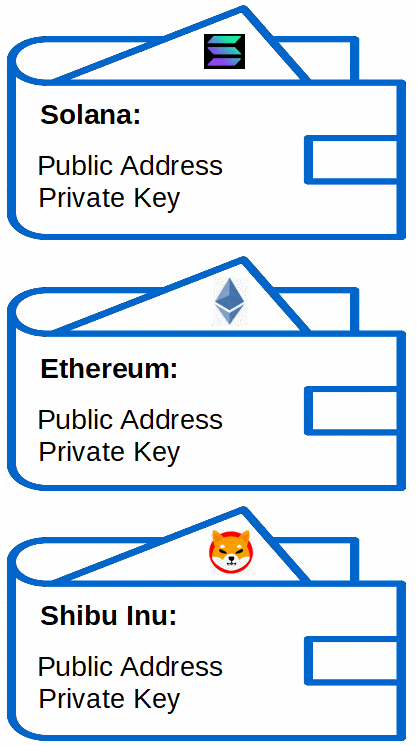
What is a Public Address?
AKA: Sometimes referred to just as ‘the address’ eg What’s your Ethereum address?
The address is the location on the blockchain where details about your transactions (and therefore how much you own!) are stored and updated.
Why the address in a wallet is described as Public.
The address is the part you can share with other people/exchanges so they can put money IN to your wallet. It is similar to your bank account number.
The address you share with other people will be exactly the same address you use yourself to add crypto to your own wallet.
If someone wanted to send you Ethereum for example, then you would need to share with them your “Ethereum wallet address”.
If they wanted to send you Solana, you would need to tell them your “Solana wallet address” and so on.
Taking care of your Wallet Addresses
When you start moving crypto from one wallet to another the importance of checking your address should not be underestimated.
If you share the wrong address, it is possible that not only will you not receive the crypto coins that have been sent, but in some cases, those crypto coins will also be lost and gone forever!
Fortunately, each blockchain has its own format for creating the public address usually with embedded verification to reduce the chance of a typo being accepted when making a transaction. This, however, does not make it impossible and MANY MANY people have lost money by not checking the addresses.
“I still find the reality of using wallet addresses a bit scary and intimidating, as do many other people who own crypto. At least with a bank, if you send money to the wrong account number there is a possibility (!) that the bank could help you get it back. Not with crypto. If a transaction has gone to the wrong address but is verified, it cannot be reversed.”
What is a Wallet Private Key?
AKA: Sometimes referred to just as a ‘key’
The system for moving crypto OUT of your wallet is very different and that requires a Private Key. Neither you nor anyone else can remove crypto from your wallet without the Private Key.
Your wallets’ Private Key is like a very long password made up of a long string of letters and numbers. Just like a password or bank account PIN code, this should not be shared with anyone!
There is also another password like phrase that is associated with Wallets called a Seed Phrase but to understand the difference we need to explain a bit more..
Managing Wallets
Writing code to create your own wallet is possible (!) but it is definately not straight forward and requires a computer programmer level of confidence in the process!
So, now imagine creating multiple wallets, one for each coin/token, and each one having its own address and private key. It can quickly become difficult to manage and is definately unneccessary.
That is where the different TYPES of wallet come in and make the process much more user firendly (although they still have a way to go in my opinion!)
That is also where I was initially confused !!
Which Wallet Confusion:
The term Wallet can be used in a confusing way within the crypto world!
BEFORE:
When the crypto world started it was first necessary to create your own wallet, and only then could you buy some crypto. Creating a wallet required the creation of your Public Address, on the chosen crypto’s blockchain and simultaneously the creation of the Private Key (derived from the address) needed to access that address. These wallets are specific to their blockchain.
You, therefore, have an Ethereum Wallet for transactions on the Ethereum blockchain and an Solana Wallet for transactions on the Solana Blockchain.
NOW:
With multiple blockchains and thousands of coins available the term ‘wallet’ has ALSO, confusingly, been taken by the various TYPES of wallet (custodian wallet, mobile wallet, hardware wallet, etc) by which you can store multiple crypto addresses and private keys.
These TYPES are actually a ‘Wallet of wallets’.
Each TYPE of wallet can contain a series of wallets.
e.g A Mobile wallet might containSolana, Ethereum, Shiba Inu, and Stellar wallets!
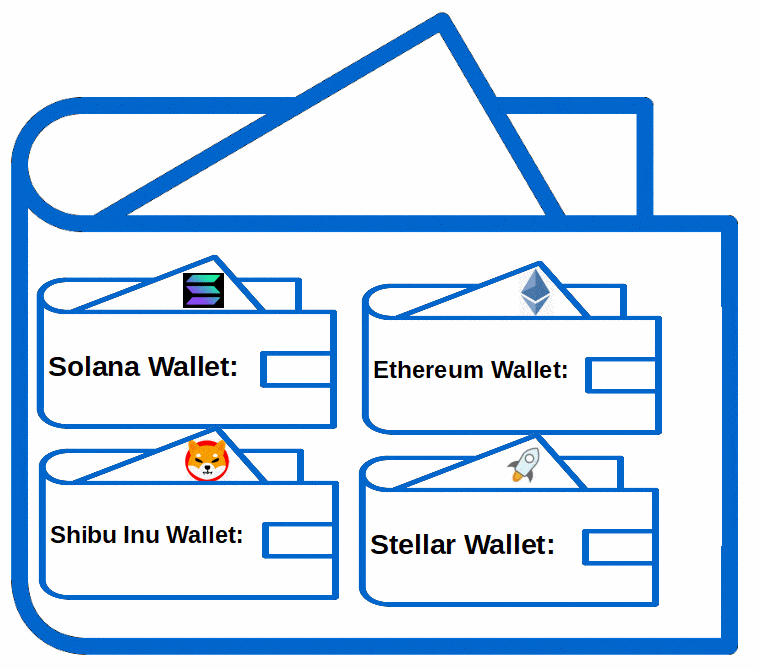
HOWEVER, although initially confusing, in practice it is not really a problem!
Transactions only require the address and private key of the coin you wish to trade and the address of the location to which you are sending it.
If you are trading using the Ethereum in your mobile wallet you would use your mobile wallet Ethereum address and private key.
If you were using the Ethereum in your hardware wallet you would use your hardware wallet Ethereum address and private key.
When signing up/registering for one of the different TYPES of wallet they generally add another layer of security. They create a Seed Phrase which is like a master password.
What is a Seed Phrase?
They call it a phrase but actually it is simply a unique sequence made up of 12 or 24 random words. In a particular order!
The Seed phrase is usually automatically generated, cannot be changed, and is shared with you when you first open a new wallet.
(NB: Some wallets will allow you to create your own Seed Phrase)
Example Seed Phrase:
WIZARD CLOSE WARM ROAD MOST ICE
PRACTICE ABSORB FEED SHAME AGAIN POST
Your seed phrase is used, often with other forms of identification such as 2FA, Biometrics etc to control access to your wallet. It is like a master password that then gives you access to your sub-wallet details without you having to remember them all individually.
NOTE:
This is NOT the same as your regular online passwords. If you forget or lose your regular password this can be a royal pain, but often you can contact support to recover your password or create a new one.
However, this is not the case with your crypto Seed Phrase. If you lose or forget the words, then you risk losing access to all the private keys and therefore all the crypto held in that particular wallet!
If you break your phone, pc or hardware that contains access to your all passwords as long as you have your seed phrase you will be fine. You can simply use the required software on a different phone, pc or hardware and using your seed phrase again have access to your wallet.
It is therefore VERY important that you record the seed phrase somewhere safe. Ideally physically recorded eg on paper so it cannot be stolen by hackers / phishers!
If all this talk of keys, passwords, and losing your crypto forever is making you feel uncomfortable you are not alone! That is why most people start with Custodial Wallets!
How to choose your Wallet
Crypto wallet types generally fall into two categories: Custodial Wallets, where someone else takes care of the management and overall security (addresses,private keys, seed phrases etc) for you, and Non-custodial Wallets where it is down to you to keep your private keys and seed phrases safe.
Custodial (or Hosted) Wallets
Custodial wallets can feel like the easiest and simplest way to store your crypto.
This was the very first kind of wallet I owned and I didn’t even know it was a wallet!
I was keen to buy some crypto right away, so created an account on a crypto exchange, added some money to my account, and started buying different crypto coins with it.
In this case, the crypto exchange created a wallet for me and managed all the security side of things, addresses, keys, seed phrases etc.
There were no critical secret keys for me to remember or hide under my bed. (not a recommended method by the way!)
Instead, the exchange held all the keys to my wallet and I simply accessed my crypto through my exchange account.
When I log into my exchange account, my wallet and crypto are right there ready to go.
In this case, I am entrusting my crypto to a third party (the exchange), not unlike storing my money in a bank account.
Custodian Support
I still have a password to ‘Login’ but if I forget it I can contact the exchange, verify who I am and I still have all my crypto!
Therefore, when you are choosing a Custodial wallet it is very important to know how trustworthy and secure that Custodian is. Are you placing your crypto into a safe pair of hands?
Targeted Hacking
During the early development of Crypto, significant amounts of crypto were lost from third-party custodial wallets through hacks and fraud. That is where all the private keys were stored so a natural target for hackers. Customers who had handed over the responsibility for their keys lost everything.
So what has changed?
Custodian companies have started to invest very heavily in security and the best now even have insurance or a recovery fund to compensate customers if their crypto is stolen through the Custodial Wallet.
If I was choosing a Custodian wallet now I would be looking at what insurance they have to cover customer loss, how much they have set aside to pay compensation, and what the terms are for making a claim.
This is not dissimilar to your high street bank that guarantees to cover the first $xxxx dollars of your saved money should the bank get into financial difficulties.
Let’s consider some of the pros and cons of keeping your crypto in a Custodial Wallet.
Pros of Custodial Wallets
Cons of Custodial Wallets:
“Personally, I have chosen to mainly use Custodial Wallets based in the U.S and Europe and have been cautious about the amount of crypto I have stored in Custodial Wallets elsewhere in the world.“
To be honest it felt pretty uncomfortable the first time I opened a crypto exchange account and had to upload photos of my Passport to proceed. With identity theft being what it is these days I was worried that I could be opening myself up to a whole world of pain. Then I reflected that a myriad of different organizations had taken copies of my passport as proof of ID so it boils down to a question of trust!
If you are not comfortable with sharing this information another type of wallet would be more suitable for you.
Historically, some Custodial Wallet security breaches have led to catastrophic losses for customers, giving rise to the mantra “Not your Keys, Not your Coins!”
Security has greatly improved over the years but there is always the potential for the next big hack on the horizon if you do not choose your host wisely.
Alternatives to a Custodial Wallet
Mobile wallets, Browser Wallets, and Hardware wallets are the three largest categories of Non-Custodial wallets.
The first two are considered Hot Wallets because they rely on being connected to the internet. Hardware Wallets are described as Cold Wallets because they store your crypto offline on a separate device that you must keep safe.
Do YOU need a hardware wallet? Find out here.
Before choosing a wallet you should understand the pros and cons of Cold wallets and Hot Wallets as it is likely you may choose to use a mix of both in the future.
Cold Wallets
These are usually considered the most secure form of wallet. You physically have the object where the digital data is stored and it is NOT connected to the internet, so cannot be hacked.
You can think of Cold wallets as being similar to a bank’s savings account. They are used for long-term storage of cryptocurrencies, holding larger sums that you do not plan to touch or use regularly.
Pros:
Cons:
Which Cold Wallet / Hardware Wallet? How do they compare? Find out here.
Hot Wallets:
Hot wallets can be compared to your regular current account or checking account with your bank, where they are used for the everyday spending of cryptocurrencies. Think of them like the purse or wallet you carry around every day. You wouldn’t keep your life savings in them, just an amount you are likely to need day to day.
Pros:
Cons:
There are many ways to store crypto and now you know the key differences between them.
Having decided on which formats might be most suitable for you here is some further reading:
Crypto Mobile Wallets for Android
